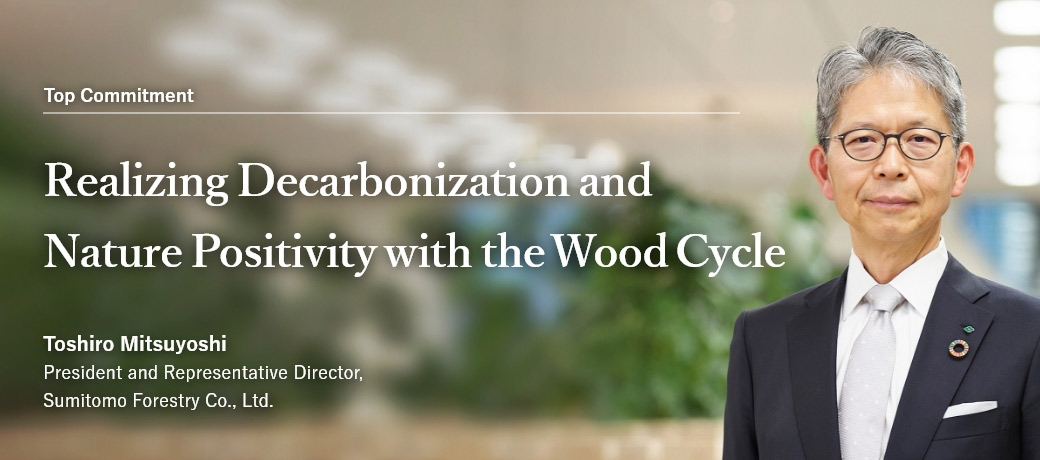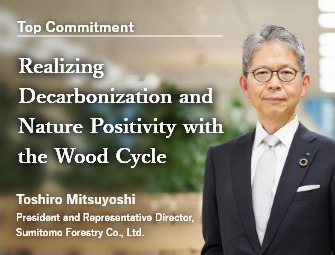- Home
- Sustainability
- Top Commitment
Top Commitment


An era of uncertainty where past assumptions no longer apply
"The hottest summer in recorded history." This is a phrase we have heard made times over the years, but 2024 was exceptional. All over the world, regions experienced the highest temperatures ever. According to the leading climate research center Berkeley Earth, the average earth’s temperature was at least 1.6°C higher than pre-industrial era levels. Rising temperatures and more frequent and severe natural disasters are becoming the norm, not only severely impacting business operations but also threatening people’s daily lives.
In Japan, 2024 began with the devastating Noto Peninsula earthquake on New Year’s Day. This was followed by an unprecedented series of torrential rains, landslides and other natural disasters that took a tremendous human toll. As we entered 2025, we also saw frequent major forest fires in such areas as Ofunate in Iwate Prefecture due to the lack of rain. Overseas, a M7.7 earthquake devasted Myanmar on March 28th, causing major fatalities and infrastructural damage. In dire need, the country looks to the world for assistance and Sumitomo Forestry Group is responding with support to a Japanese NGO for their on-site medical efforts.
2024 was also an extraordinary election year with parties and candidates favoring nationalistic policies claiming victory in many countries and regions. Our global economy, which until now thrived in the spirit of mutual cooperation and dependence, is facing a critical turning point. Although sustainability-related laws and regulations were becoming stricter, the April passage of EU’s Omnibus Package made an about-face, removing numerous companies from the scope of the Corporate Sustainability Reporting Directive (CSRD), postponing reporting deadlines, simplifying reporting requirements and halting the transition from the level of limited assurance to the more demanding reasonable assurance. In 2022, Sumitomo Forestry Europe Ltd. moved outside the EU to London, UK, and is hence no longer subject to CSRD regulations. However, we will continue to monitor the latest developments and ensure that the timing and content of our disclosures remain fully comparable from an investor perspective. Now more than ever, we believe it is crucial to take a medium- to long-term perspective in our persistent pursuit for sustainable management.
Decarbonization of society through our Wood Cycle
In February 2022, we announced Mission TREEING 2030, our long-term vision with the same 2030 target year as our SDGs. One of our business policies under this mission is maximizing the value of forests and wood to realize decarbonization and a circular bioeconomy. Last year, the final year of our three-year Medium-Term Management Plan Phase 1, we focused on initiatives that increased carbon dioxide (CO2) absorption and sequestration levels in the forestry, timber, construction and energy sectors through our value chain, the Sumitomo Forestry Wood Cycle.
In the area of forests, our first forestry fund to acquire forest assets is progressing smoothly. The total forest area we now own or manage reached 365,000 hectares as of the end of 2024. In the area of timber, our efforts to promote wood change resulted in the launch of Kowa no Mori Inc., our first step in creating a timber industrial complex in Iwaki, Fukushima Prefecture. Commercial production is scheduled to begin in the spring of 2026.
Trees absorb CO2 through photosynthesis and wood continues to store a huge volume of carbon even after harvesting. The standardization of carbon neutral design is key to the popularization of wooden structures. In the construction sector, we promoted both the construction and product life extension of wooden detached houses and supplied about 25,000 units annually in Japan and overseas. For non-residential construction, we built medium- to large-scale wooden offices and other buildings in the United States, Australia, the United Kingdom and Japan.
As part of our efforts to reduce greenhouse gas emissions and decarbonize our business operations, we newly acquired certification in November 2024 of our FLAG (forests, land and agriculture) sector net-zero targets for 2050 set in accordance with SBT guidance. At the same time, we upwardly revised our 2030 short-term greenhouse gas emissions reduction target from a 54.6% reduction compared to fiscal 2017 levels to a 42% reduction compared to fiscal 2021 levels. Fiscal 2024 was not only the final year of our Medium-Term Management Plan Phase 1, but it was also the mid-way turning point between our acquiring SBT certification in 2018 and our target year of 2030. Thanks to such achievements as a reduction of our coal co-firing rate to 5% levels at our Mombetsu Biomass Power Plant, we have significantly exceeded our goals. At the same time, capital expenditures and Sumirin Denki, our electricity service for post-FIT owners, have enabled us to achieve our Phase 1 goal with a 36.3% renewable energy procurement rate under RE100.
To conserve and recycle resources and realize a circular economy, our Housing Division has promoted such initiatives as the pre-cutting of lattice panels, roof slates and sidings, which resulted in a 5.1% reduction in our industrial waste volume and a 95.6% recycle rate during the three years of our Medium-Term Management Plan Phase 1. However, both of these figures fell short of our goals, and we will need to accelerate our efforts for the next three years of Phase 2.
Mission TREEING 2030, the next stage
Guided by our long-term vision Mission TREEING 2030, we are promoting the Wood Cycle, our company’s value chain to transform society as a whole by protecting biodiversity and the global environment, contributing to people and society, and creating economic value. Based on our achievements during Phase 1, which ended in 2024, we announced Mission TREEING 2030 Phase 2 in February. In this, we upwardly revised our 2030 targets from 250 billion yen to 350 billion yen in recurring income, from 500,000 hectares to 1 million hectares of forest area owned or managed, and from 50,000 units to 65,000 units of housing supplied overseas.
In September 2024 with the 51% acquisition of Australia’s largest builder Metricon Group, we secured an overwhelming market share with more than 7,000 new housing starts per year. In Victoria, energy efficiency standards were enhanced in 2023 requiring the installation of solar panels for all newly built detached houses. However, even before these regulations were put in place, we have been proactively working with the Henley Group on energy-saving initiatives to lead the industry in promoting carbon neutral design.
In Japan, the Revised Building Energy Efficiency Act was finally put into effect in April 2025. All buildings, including wooden detached houses, must now comply with energy conservation standards, accelerating decarbonization in the construction sector in the move toward carbon neutrality by 2050. Under the initiative of the Cabinet Secretariat, the Inter-Ministerial Liaison Conference on Life Cycle Carbon Reduction of Buildings was established in November 2024. This body brings together the supervisory authorities of a wide range of industrial sectors, from raw materials to construction materials, equipment, design, and construction, to promote decarbonization not only during occupancy but for the building’s entire life cycle. Through One Click LCA, EPD labeling and other initiatives, Sumitomo Forestry Group has been working to reduce embodied carbon* and provide solutions for the entire value chain of buildings. The fact that our long-term vision Mission TREEING 2030 aligns with government policies is giving us an even stronger sense of resolve.
*CO2 emissions from a building’s entire life cycle, from raw material extraction and processing to transport, installation, construction, repair, demolition and recycling
Assessing the value of forests for nature positivity
In addition to our decarbonization initiatives prioritized in Phase 1, we will accelerate our efforts during Phase 2 to halt nature loss and contribute to nature positivity by 2030. Towards this end, we formulated our Nature Positive Statement in February. One concrete measure is creating a method to accurately assess the value of forests, an important first step. In addition to biodiversity conservation, forests form an ecosystem that includes air, water and soil. While up until now, forests were only valued based on the sales price of the wood products produced, a secondary value called carbon absorption and fixation has become apparent with the emergence of forest-derived carbon credits. Even though forests have significant societal value in terms of positive externality for their ability to clean air, conserve water resources and prevent landslides, there is yet no set evaluation method. It is vital that we determine a way to properly convert evaluation indices into economic value and bring about a technological revolution that incentivizes sustainable forest management and attracts investments. Sumitomo Forestry became a member of WBCSD (World Business Council for Sustainable Development) and ISFC (International Sustainable Forestry Coalition), which was newly established in 2023, and is collaborating with other forestry companies to create new rules. By promoting our Wood Cycle in the areas of forestry, timber, construction and energy, we are working to resolve our shared societal problems.
An organization and people capable of responding to a rapidly changing environment
As we pursue the further globalization of our operations, the expansion into new business areas such as biorefinery, and the transformation of our existing businesses, our people and our organizational structure will be crucial to steering the course. In addition to Safety First and our Declaration on Health Management, we formulated the Sumitomo Forestry Group Declaration on Diversity, Equity and Inclusion in April 2024 and implemented a new human resources evaluation system. Through human resources development, greater engagement and thorough compliance, we are working to create an inclusive organization and workplace where a diverse group of employees can thrive and achieve their full potential.
Ever since our establishment in 1691, Sumitomo Forestry has sought to provide value not only for our own operations but also for the whole of society in line with our Sumitomo Business Spirit to "benefit self and benefit others, private and public interests are one and the same." At Sumitomo Forestry Group, all of us are committed to working together with our many business partners and stakeholders both in Japan and overseas to help create a sustainable and prosperous society.
- Home
- Sustainability
- Top Commitment

